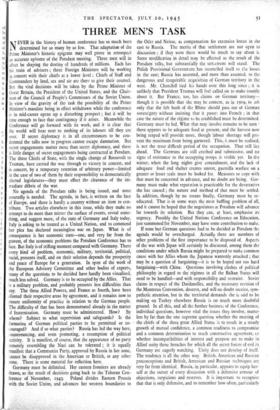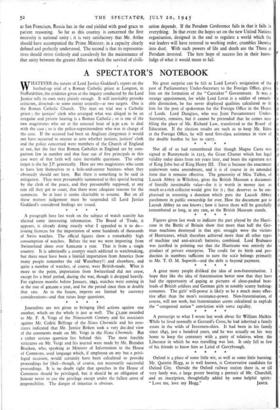- THREE MEN'S TASK
M EVER in the history of human conference has so much been j' determined for so many by so few. That adaptation of the Prime Minister's historic epigram may well prove in retrospect an accurate epitome of the Potsdam meeting. Three men will in effect be shaping the destiny of hundreds of millions. Each has his train of advisers ; three Foreign Ministers will be working in concert with their chiefs at a lower level ; Chiefs of Staff and Commanders by land, sea and air are there to give their counsel. But the vital decisions will 'be taken by the Prime Minister of Great Britain, the President of the United States, and the Chair- man of the Council of People's Commissars of the Soviet Union. In view of the gravity of the task the possibility of the Prime Minister's mandate being in effect withdrawn while the conference is in mid-career opens up a disturbing prospect ; but it will be time enough to face that contingency if it arises. Meanwhile the Conference will go forward with its work, and it is clear that the world will hear next to nothing of its labours till they are over. If secret diplomacy is in all circumstances to be con- demned the talks now in progress cannot escape damnation. But secret engagements matter more than secret diplomacy, and there is little danger of secret engagements being contracted at Potsdam. The three Chiefs of State, with the single change of Roosevelt to Truman, have carried the way through to victory in concert, and in concert, by a temporary retention of arbitrary power—limited in the case of two of them by their responsibility to democratically elected legislatures—they must effect the clearance of the im- mediate debris of the war.
No agenda of the Potsdam talks is being issued, and none assuredly is needed. The agenda, in fact, is written on the face of Europe, and there is hardly a country without an item to con- tribute. Two articles elsewhere in this issue, while they make no attempt to do more than mirror the surface of events, reveal some- thing, and suggest more, of the state of Germany and Italy today. Italy is asking to be treated as a United Nation, and to commend her plea has declared meaningless war on Japan. What is of consequence is her economic state—one, and very far from the gravest, of the economic problems the Potsdam Conference has to face. But Italy is of trifling moment compared with Germany. There every kind of problem, economic, military, territorial, political, racial, presents itself, and on their solution depends the prosperity and peace of Europe for a generation. In spite of the work of the European Advisory Committee and other bodies of experts, many of the questiohs to be decided have hardly been visualised, much less solved. Germany is, to be occupied by the Allies. That is a military problem, and probably presents less difficulties than any. The three Allied Powers, and France as fourth, have been allotted their respective areas by agreement, and it remains now to ensure uniformity of practice in relation to the German people. The difficulty of that has been demonstrated already in the matter of fraternisation. Germany must be administered. How? By whom? Subject to what supervision and safeguards? Is the formation of German political parties to be permitted or en- couraged? And if so what parties? Russia has led the way here, countenancing, and even promoting, a resumption of political activity. It is manifest, of course, that the appearance of no party remotely resembling the Nazi can be tolerated ; it is equally manifest that a Communist Party, approved by Russia in her zone, cannot be disapproved in the American or British, or any other zone. There is some material for reflection here.
Germany must be delimited. Her eastern frontiers are already drawn, as the result of decisions going back to the Teheran Con- ference of November, 1943. Poland divides Eastern Prussia with the Soviet Union, and advances her western boundaries to the Oder and Neisse, as compensation for extensive losses in the east to Russia. The merits of that settlement are not open to discussion ; if they were there would be much to say about it. Some modification in detail may be effected as the result of the Potsdam talks,, but substantially the sett.ement will stand. The Polish Provisional Government has reconciled itself to the losses in the east; Russia has assented, and more than assented, to the dangerous and inequitable acquisition of German territory in the west. Mr. Churchill tied his hands over this long since ; it is unlikely that President Truman will feel called on to make trouble about it. But France, too, has claims on German territory— though it is possible that she may be content, as in 1919, to ask only that the left bank of the Rhine should pass out of German sovereignty without insisting that it passes into French ; in that case the nature of the regime to be established must be determined. Germany must be fed. What that may involve remains to be seen there appears to be adequate food at present, and the harvest now being reaped will provide more, though labour shortage will pre- vent the maximum from being garnered. This, it. must be realised, is net the most difficult period of the occupation. That still lies ahead. The Germans are still crushed and submissive, and no signs of resistance to the occupying troops is visible yet. In the winter, when the long nights give concealment, and the lack of adequate food and shelter creates unrest, guerrilla warfare on a greater or lesser scale must be looked for. Measures to cope with that must be concerted in advance, and no doubt are being. Ger- many must make what reparation is practicable for the devastation she has caused ; the nature and method of that must be settled. In addition, though by no means finally, Germany must be re- educated. That is in some ways the most baffling problem of all, and it cannot be hoped that the negotiators at Potsdam will advance far towards its solution. But they can, at least, emphasise its urgency. Possibly the United Nations Conference on Education, just summoned for November, may have some contribution to make.
If none but German questions had to be decided at Potsdam the agenda would be overcharged. Actually there are numbers of other problems of the first importance to be disposed of. Aspects of the war with Japan will certainly be discussed, among them the conditions under which Russia might be prepared to make common cause with her Allies whom the Japanese wantonly attacked ; that may be a question of bargaining—it is to be hoped not too hard bargaining—with China. Questions involving clashes of political philosophy in regard to the regimes in all the Balkan States will need to be handled—and with responsibility and restraint. Soviet claims in respect of the Dardanelles, and the necessary revision 'of the Montreux Convention, deserve, and will no doubt receive, sym- pathetic attention, but in the territorial demands she is said to be making on Turkey elsewhere Russia is on much more doubtful ground. In all this, and all the further business of the Conference, individual questions, however vital the issues they involve, matter less by far than the one supreme question whether the meeting of the chiefs of the three great Allied States is to result in a steady growth of mutual confidence, a common readiness to compromise and a common determination to reach constructive agreement, cr whether incompatibilities of interest and purpose are to make in Allied unity those breaches for which all the secret forces of evil in Germany are eagerly watching. Unity does not develop of itself. The tendency is all the other way. British, American and Russian preconceptions and British, American and Russian techniques are very far from identical. Russia, in particular, appears to equip her- self at the outset of every discussion with a defensive armour of objections, suspicions and reserves. It is important to recognise that that is only defensive, and to remember how often, particularly at San Francisco, Russia has in the end yielded with good grace to patient reasoning. So far as this country is concerned the first necessity is national unity ; it is very satisfactory that Mr. Attlee should have accompanied the Prime Minister, in a capacity clearly defined and perfectly understood. The second is that its representa- tives should strive tirelessly and ceaselessly for the maintenance of that unity between the greater Allies on which the survival of civili- sation depends. If the Potsdam Conference fails in that it fails in everything. In that event the hopes set on the new United Nations organisation, designed in the end to, regulate a world which the war leaders will have restored to working order, crumbles likewise into dust. With such powers of life and death are the Three at Potsdam invested. The best hope of success lies in their know- ledge of what it would mean to fail.



























 Previous page
Previous page